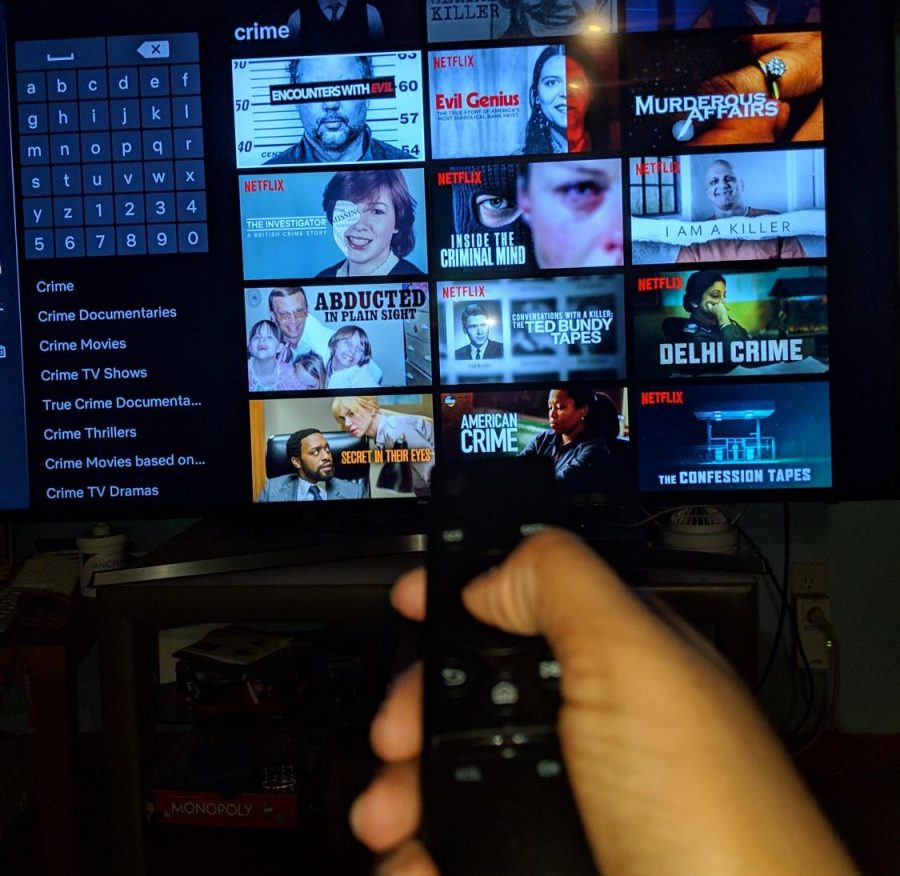Crime in the media
Viewer browsing through the crime films and shows on Netflix for entertainment
May 2, 2019
When most people think of a criminal, they think of someone who has committed a crime and is being punished for it. However, now through portraying them through the media, that idea of a criminal seems to be forgotten. My odd ‘guilty pleasure’ is watching anything about crime, which happens to be millions of other viewers’ favorite form of media too. True crime has become one of the most popular genres in popular culture today, however, there is a reason why I and many others have always felt guilty about loving it. As more and more people are becoming fascinated with crime, it is time to ask ourselves the question: Are we ultimately glorifying criminals through the media?
It makes sense that many are interested in the actual criminals themselves. Society wants to know about their lives and why they ended up the way they are. But when the public starts to get intrigued by criminals, creating more documentaries, movies and TV shows about their lives and their crime, the viewers end up negatively building up their fame. This year, news broke out about the making of Extremely Wicked, the movie starring famous actors Zac Efron and Lily Collins. Efron is playing the role of Ted Bundy, a serial killer who kidnapped, raped and killed a number of young women. To stimulate the press of the movie, Netflix released Conversations with a Killer: The Ted Bundy Tapes, a documentary directed by the same director, Joe Berlinger.
All the popularity and press revolving around this killer brought many unusual comments from women, admitting that they were attracted to the killer and his charming looks. The hype for this killer even concerning to Netflix. A Netflix social media representative posted on Twitter, “I’ve seen a lot of talk about Ted Bundy’s alleged hotness and would like to gently remind everyone that there are literally THOUSANDS of hot men on the service — almost all of whom are not convicted, serial murderers.” Some critics even went on to state that the casting of Zac Efron could ultimately be romanticizing the killer. Director Joe Berlinger responded to the criticism by saying, “You can’t watch this film and say that we’re glamorizing or glorifying Bundy. What we’re doing is portraying the psychology of deception and betrayal.” However, this film along with several others like crime shows and movies could unintentionally glamorize violence and crime without highlighting the consequences. This could trigger a ‘copycat’ effect for some in the audience. This can be proved through multiple studies including Oxford Encyclopedia Criminology and Criminal Justice research, which showed that when young minds are repeatedly reacting to images of crime and violence, they are desensitized to the acts.
School shooters have also been a controversial topic about whether the media is wrongly shining the spotlight on them. School shooters have had their place in the media for a while now, with the fame starting on the Columbine shooters. The coverage on them stirred up their negative fame as well, which seems to have motivated a few who went on to see them as their ‘role models’. Washington Times said, “The 1999 Columbine High School massacre gave rise to a fascination with the two teenage killers and mass shootings in general, spawning a social media subculture and inspiring dozens of disturbed young men to seek fame and vengeance by emulating their deadly heroes.”
Society was genuinely interested in the Columbine shooters and their motives, unintentionally disregarding the few who were interested in them for the wrong reasons. Those few were inspired by them and wanted to mimic a similar shooting crime, with this pattern going on to be called the Columbine effect. A study from ABC News showed that 17 school shooters and 36 students who threatened potential attacks stated the Columbine shooting as their motivation. Many news outlets have recognized the consequence of this media coverage, and have chosen to not put out the names or pictures of school shooters, as that is what many shooters strive for. This could potentially limit future mass shootings, especially in schools.
America is guilty of the glorification of criminals in the same way criminals are guilty of their crimes. This does not mean that we should not talk about these crimes altogether. Instead of giving fame to criminals, the public needs to shine the light on the victims and their families, giving them a voice and platform to express their stories. Most criminals have motivations and reasons for their crime, and when we give them fame, we could be fulfilling that motive. It is important for media outlets and the film industry to know what they are putting out and potentially be promoting, as well as our society to know who we are giving a voice to. Crime can be a fascinating topic, but society needs to remember that laws have been broken and in most cases, innocent victims are involved.



